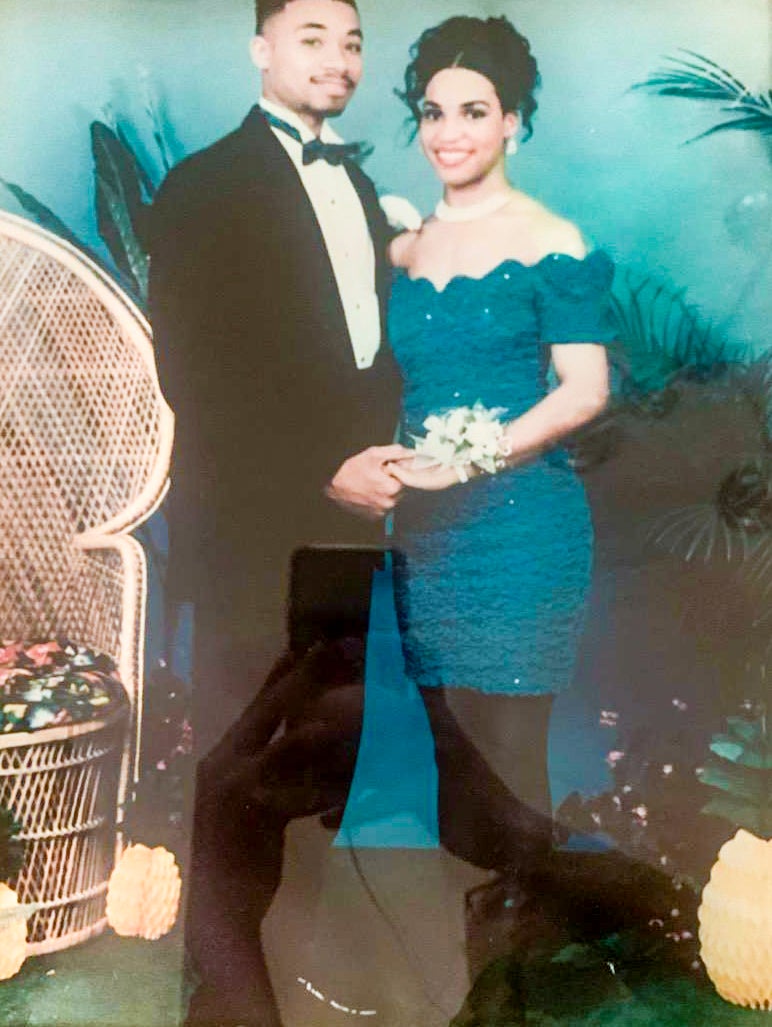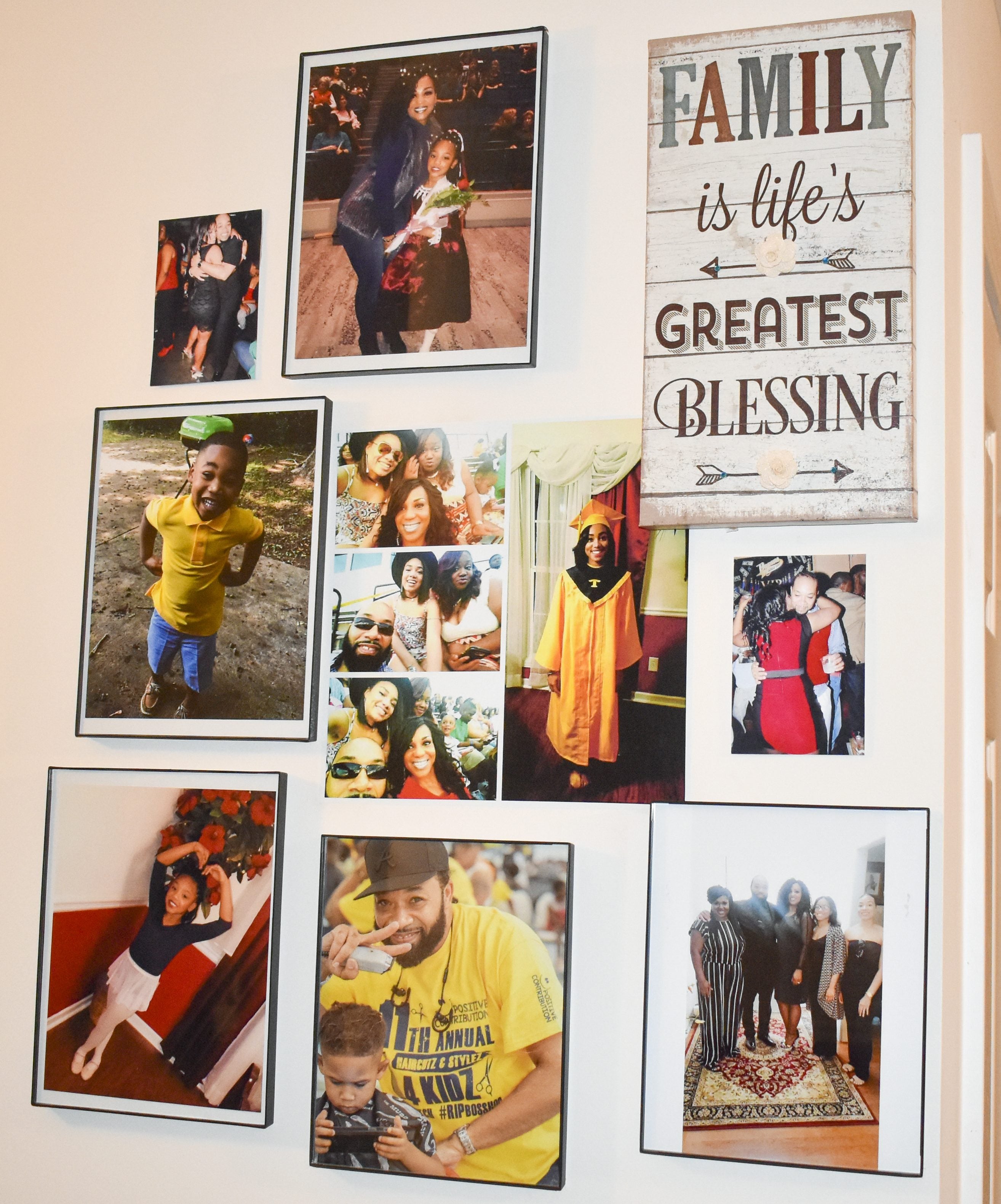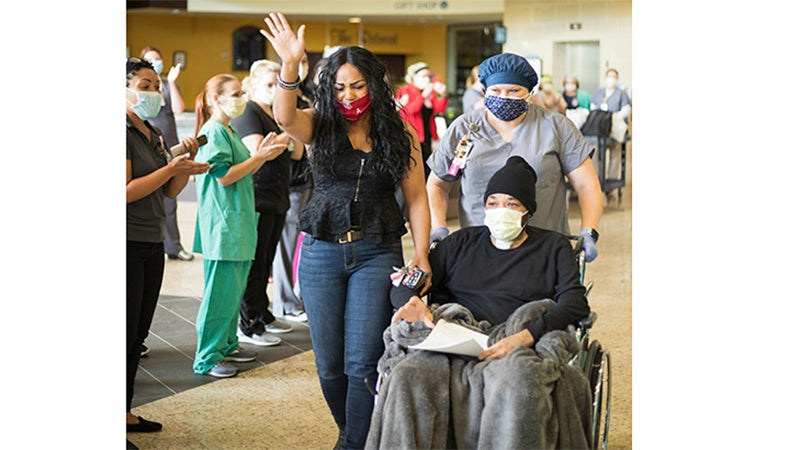Fighting to come home: First COVID-19 patient in Troup County shares story
Published 9:00 pm Tuesday, May 12, 2020

- David Simpson sits in his living room next to his wife, Veronica Simpson, after spending almost two months in the hospital fighting and recovering from COVID-19. He was in a coma for two weeks and was transferred between two hospitals between March 13 and May 1. — Dustin Duncan
|
Getting your Trinity Audio player ready...
|
WEST POINT — David Simpson lost two weeks of his life due to COVID-19.
He went to sleep on Sunday, March 15, at WellStar West Georgia Medical Center, thinking the hospital was treating him for pneumonia. He woke up two weeks later at WellStar Kennestone Hospital in Marietta with a tube in his throat and unable to talk. He was the first confirmed case of COVID-19 in Troup County, and he was in the hospital until May 1.
Simpson has been a barber in the LaGrange community for 25 years and could usually be found cutting hair at Northside Barbershop on Ridley Avenue in LaGrange. He’s been married to his wife, Veronica Simpson, for those 25 years. Veronica has been a barber for the past 17 years, most recently with her own clientele at Haircutz by Veronica in LaGrange.

Pictured is a photo of David and Veronica Simpson during their senior prom. — Contributed
Feeling ill
On March 9, Simpson said he started to feel exhausted with what he thought were flu-like symptoms. He started feeling bad the night before, so he took the day off work and went to Summit Urgent Care in LaGrange. He said he was given a steroid shot, cough syrup and an inhaler to help regulate his breathing. After being sent home, Simpson took the next day off work to see if the medicine would improve his health.
On Wednesday, things weren’t better, and Simpson felt the need to go to a hospital. He called a friend and was taken to the hospital in Newnan, where he was told the same thing as at urgent care.
“It didn’t feel like the flu,” Simpson said. “I didn’t have the body aches or nausea. I just felt exhausted.”
Veronica said her husband’s labored breathing intensified even while he was sleeping, and the inhaler provided wasn’t giving him relief.
On Friday, David went back to Summit Urgent Care and had a test performed on his lungs. After the test, a practitioner at Summit told him to go straight to the WellStar in LaGrange.
That was on Friday, March 13, which was the same day the Troup County School System closed schools. Troup County didn’t yet have a confirmed case of COVID-19.
Simpson said he was aware of COVID-19 in the area, but he didn’t think it could happen to him.
“I haven’t been anywhere, and I didn’t really do anything,” Simpson said.
They said they had gone to Atlanta but hadn’t left the state or the country.
Just pneumonia
Simpson was admitted to WellStar that Friday, but he thought he was being treated for pneumonia based on conversations at the hospital.
“I thought, ‘I can deal with that,’” he said. “Give me just a couple of days, and I’ll be back and good to go.”
He said the doctors or nurses never mentioned COVID-19 as a possibility to him.
On that Friday, Veronica was at her barbershop when she learned her husband was in the hospital. When she made it to the hospital, she was allowed to see Simpson but had to wear personal protective equipment and couldn’t get close to him.
“They were saying we don’t think it’s COVID-19, but it’s a possibility,” Veronica said. “I’m thinking, ‘no, surely it’s not COVID-19.’ But I’m scared, and I’m looking at him, and he’s not getting any better.”
At this point, Simpson had tested positive for pneumonia, but doctors were telling Veronica they were concerned it could be more, and they had tested him for COVID-19. Veronica said that’s when they transferred Simpson to another room, and visitors were no longer allowed into the room — even his wife. He was also put on a ventilator.
“They were telling me that it’s not only for his safety but for my safety as well,” Veronica said. “You look at the doctors and all of them wearing protective gear to cover their whole body pretty much, and it’s like looking at something on TV, but it was right here in LaGrange.”
On Sunday morning, Veronica received a call from Simpson at about 7 a.m. She said he had a hard time talking, but she could hear him say, “Tell the girls, I love them.”
He was referring to their three daughters.
Veronica said she still didn’t know the status of her husband’s health after the call. She was waiting on a phone call.
“It was scary, and it was the worst time,” she said. “Everybody was on pins and needles just waiting on that phone to ring and get an answer. You see him go from a talkative, humorous guy who is always smiling, to somebody who can’t get out of bed and is barely keeping up with their breath.”
By the time that call came, David was in a coma.
Before Veronica got the call from the hospital, rumors circulated town after information released by the Georgia Department of Public Health District 4 revealed that Troup County had its first COVID-19 case. The news release that Sunday did not include age or gender. However, Veronica said people were saying they heard it was a 45-year-old man.
From there, Veronica said rumors started flying about Simpson being on his last breath at WellStar, and they were ready to put him in hospice care. She just had to cling to the belief that it wasn’t Simpson because she had no information to think otherwise.
At about 9 p.m., Veronica received a phone call from the hospital, confirming her fears.
“They told me my husband was the one that has COVID-19,” she said.

Pictured is a collage of family photos hanging in the home of David and Veronica Simpson. — Dustin Duncan
Open a door somewhere
After learning her husband was the first COVID-19 patient in Troup County, Veronica turned all of her attention on trying to find a way to save him. She said the hospital told her that West Georgia Medical Center didn’t have the treatment options he needed, and they were trying to transfer him. She said at the time he was only breathing 20 percent on his own.
“Right then, I’m like, Lord, please help us. Open a door somewhere,” she said.
The hospital informed Veronica about a potential opening at WellStar Kennestone opening soon, but the intensive care unit was full at the time. Fortunately, a room in Marietta opened the next morning, and Simpson was transported. However, he wasn’t breathing on his own.
When they were about 30 minutes away, Veronica received a call from a WellStar doctor to get her consent to put Simpson on a life support machine. She was told the hospital didn’t know if it would save his life or not.
“But this if this doesn’t work, this is a last resort,” Veronica said the doctor told her.
She said whatever they could do to keep him alive, then do it.
Veronica was told if Simpson’s body can take it, he will live. If not, there was nothing else the hospital could do for him.
“That’s when I got scared, and I was crying and praying,” she said. “It was awful.”
Waking up
Later that day, Veronica received a call saying Simpson’s body responded well to the life-support machine, and now it was a waiting game for his lungs to begin healing.
Simpson was still not awake, and Veronica was also not allowed to see her husband. The only information she received was through doctors or nurses. She said they called her every day with updates on his condition.
While the machine was critical, Veronica said the doctors also used a medicine called Tocilizumab that they felt would fight the COVID-19 virus. The treatment is supposed to block the inflammatory protein IL-6 and improves joint pain and swelling caused by rheumatoid arthritis. Veronica said the doctors told her the medicine would weaken the virus.
She said after taking medicine, Simpson’s breathing got better, but it took about two weeks for him to recover and breathe on his own.
Every day Veronica would have a nurse say something into his ear.
“Your wife, Veronica, daughters NeNe, Bookie, Sirena, and son, Kingston, and granddaughter, Starr, say we love you, and can’t wait for you to come home. Veronica says she loves you more and more, okie dokie,” was the message said to Simpson each day.
“I just wanted him to hear something familiar like those names so he could start fighting more to get back home,” Veronica said.
About two weeks after Sunday, March 15, Simpson woke up in an unfamiliar place.
“I knew I wasn’t in the same place because this place looked like a garage with a room in it,” he said.
He said he didn’t know where he was, and he wasn’t getting answers. All he wanted was his cell phone, but he had a tube in his throat so he couldn’t talk.
“Every time somebody would come in and ask how I’m doing, I couldn’t get it out,” Simpson said. “It was like a bad movie.”
To make matters worse, he pulled whatever tubes connected to him while he was in a coma because he was frightened. As a result, he said the hospital restrained him to the bed.
“That was a scary moment,” Simpson said.
Veronica said it took a minute for Simpson to grasp what was being said to him. She said she had to explain the past two weeks to him.
Simpson said the nurses assured him he was in a safe place, but he was very sick and the hospital was going to do everything it could to make him better again. He said those conversations, along with talks with his wife, helped his register the reality of the situation.
Veronica said when she received a call from Simpson that he was awake, there was nothing but pure joy.
“While he was asleep, I could only talk to doctors and nurses, so it was great to hear his voice,” she said. “When I look back to that time (when Simpson was asleep), it was the worst time of my life.”
She said just knowing she could talk to him and listen to his thoughts was a big step forward.
“He could express himself, so that felt good because in the past, I couldn’t even talk to him,” Veronica said.
Fighting to come home
After waking up, Simpson remained in the hospital for another month. During that time, he was told to rest.
“You can’t move, you can’t do nothing,” he said. “You’re weak.”
He was at Kennestone for about another two weeks before being transferred back to West Georgia Medical Center. He had to pass two consecutive COVID-19 tests before he was allowed to come home.
Veronica said that was because he wasn’t mobile enough to take care of himself, and he needed personal care. She said it would put her life at risk if he came home before doctors knew the virus was out of him.
Finally, on May 1, Simpson was allowed to come home. He was brought down to the lobby of the hospital in a wheelchair, and Veronica was there with a facemask, ready to take her husband home.
“And then all of a sudden, he calls me and said, I’m coming home tomorrow,” she said. “I’m like you sure? And he said that he passed his test so he could come home.”
Veronica said it’s something as a wife, she was waiting for, but she wanted to make sure he was really ready to come home.
“You miss that person, and you want them here, but you want to make sure they get all the treatment they need before they come home,” she said.
For Simpson, he was ready to get out of the hospital.
“It was the best thing ever,” he said. “It starts working on you mentally. Dark thoughts start running throughout your mind, like is it worth it. I just knew I needed to get back home.”

David Simpson, right, is wheeled out of WellStar West Georgia Medical Center with his wife, Veronica, by his side. David had the first confirmed case of COVID-19 in Troup County. — Jenna Oden
Starting over
Simpson said the virus has definitely slowed him down. He lost 60 pounds in the two months he was in the hospital. But, his appetite is back, and he is set to start physical therapy soon.
“It makes you look again at life,” he said.
Simpson said if it wasn’t for his wife, friends, faith in God, doctors and nurses, he’s not sure he would have made it home.
“If it weren’t for them, I wouldn’t have made it. I was already through,” he said. “That thought of what could have happened is enough to make you change and want to look at life differently.”
Now, Simpson is back in his West Point home, but he’s relearning essential human functions. He’s learning how to walk again with a walker, but even the walk from the recliner in the living room to the bedroom is exhausting. He needs a couple of moments before standing up because he gets dizzy and is temporarily on dialysis three days a week due to the attack on his kidneys.
However, Simpson said he’s OK with learning how to walk again when he thinks of the alternative.
“When you look at what could have happened, compared to now, I’ll take those little steps,” he said.





